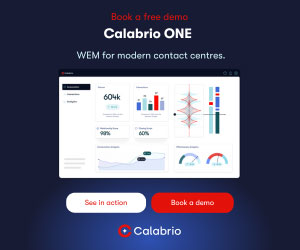Enghouse Interactive explores how independent consultancies can help businesses achieve their goals and broaden their target market. The article also underlines the importance for consultancies to be quick and flexible while maintaining a focus on the customer experience.
The world of customer experience and interaction management has witnessed a transformation. Technology and customer expectations have evolved dramatically. If they are to thrive in this challenging new world, businesses need to move fast to ensure they are delivering the best possible solutions to address specific customer needs across multiple sectors. That’s why we see a growing role for the independent consultant who can combine technical and vertical expertise with the agility to address business challenges.
Often, these kinds of consultants have been practitioners themselves and understand the day-to-day challenges. Yet they also have the ability to align the business’s goals and budget with solutions that meet the brief.
Given all that, it’s not surprising that when seeking out customer interaction solutions, businesses are increasingly turning to independent consultants who have the agility and flexibility to quickly realise benefits. Even where they are working with a larger consultancy, it’s likely they may be engaging with an independent consultant as part of that process.
It is an approach that makes sense on many levels. After all, when you look at all the touchpoints in designing and implementing an agile solution to meet an organisation’s customer engagement objectives you can see you need to consult with many parties within a business as well as IT and software system providers to deliver on that promise.
This is where we see independent consultants adding value – some have a background focused on a particular vertical. Others have horizontal experience around specific technologies like Skype for Business and Unified Communications. Many have the expertise to add significant value to any implementation of customer interaction technology. But they also add value around being able to deliver a closer, more personal engagement with the organisations with which they work.
As Stuart McClean, founder of business and technology consultancy Purple, puts it: “We deal with lots of organisations that aren’t used to dealing with large consultancy firms. They get a more personal experience in interacting with people from the top down within our organisation. Another key benefit is that being relatively small and agile we can be agnostic and impartial and take a best-fit approach to every customer scenario.”
Independent consultants can also play a key role as part of broader engagements driven by the big players. Often their value-add is the specific expertise, vertical or technical, that they can bring to the party. As Terry Lockwood, managing director of Paravail Ltd, a telecoms consultancy and project management company, said: “I have been taken on by larger consultancies on a number of occasions because their expertise does not reach the deeper technical aspects of telecommunications and telecoms services.
“They bring people like me in to work with them on the detail,” explains Lockwood. “I’ve assisted by developing and preparing presentations and carrying out implementations. I have experience across the board in telecoms which I can bring to the party.”
A Broad Market to Target
For the independent consultant, there is always a broad market to address covering a range of businesses, each with different challenges and needs.
As Matt Winckless, owner of Winckless Consulting Services Ltd, explains: “Small companies typically will not have their own internal IT departments or IT consultancy resource. It’s not necessarily a core function of their organisation but it’s nevertheless an important one. They might need a change strategy, and that’s where consultants like myself can help.
“Large organisations are often in a state of flux and they frequently need to bring in expertise specific to certain programmes or projects they are running. From a consultancy perspective, projects will often start with a compelling event like a customer service breakdown or a new business acquisition. That event kicks off quite an intense programme or project or a large piece of work. The role of the consultant is to move that on to business as usual before handing back to the client.”
Customer Experience
This more partnership-focused approach can pay dividends for independent consultants. They need to have an in-depth understanding of the technology but it’s also important that they understand how that impacts on businesses and their customers. According to Purple’s McClean: “We take pride in telling clients we are more than just a technology business. A lot of work we do is ‘business first’.
“In other words,” he continues, “let’s see what the business is trying to accomplish and how it’s affecting customers. Then, let’s make the best decisions based on those observations. It’s more effective than just saying we need a new CRM or contact centre solution and then simply trying to shoehorn those into the overall portfolio.”
In terms of the drivers for implementing customer experience and interaction management technology today, the primary ones are clear. As Matt Winckless says: “There are two main drivers – one is the need to reduce costs, the other is to improve the service as customers are becoming more demanding in today’s always-on social media world.”
Anthony Pearmain, customer experience director at consulting firm StratMetrix, sees a gap between the performance measures that businesses operating in this space use and those that he would recommend. “Customer-facing businesses can still be siloed in their mentality,” he notes. “Many customer service directors still focus on KPIs like average handle time and first call resolution.
“Moreover, some businesses just look at what has happened in the past. To get more of a forward-looking view, you need a dashboard of outcome-based metrics to tell you what is affecting your customers, your employees and your business right now.”
New Dawn
The agile operating models and specialist market expertise typical of independent consultants make them well placed to capitalise on a business environment increasingly focused on specific interactions that drive rapid results and business first projects rather than technology implementations.
As Lockwood explains: “In the past, I would be consulted on which switchboard to buy or which PBX to install. It’s now all about connectivity, looking at the customer journey such as what happens to people when they get in touch with the business? How can we bring applications to bear? Instead of talking about implementing switchboards, cabling and the like, most businesses are looking at developing a more general comprehensive offering today, and as a consultant, you have to be capable at recommending and advising them on it.”
Matt Winckless also highlights the importance of moving from a product-based approach to one focused on comprehensive business outcomes. “Over the last five to ten years, I believe the role of the independent consultant has become much more integrated into the business of the end-user. In the past, a consultant would be introduced onto a project due to their expertise in a particular piece of software. Today, they would need to be an expert in business process and business strategy. They would have to have an understanding of how to leverage technology to achieve those other business goals, brainstorm what’s needed and then deliver with it new technology solutions.”
Anthony Pearmain also points to the breadth of capability that today’s independent consultants increasingly need. “Clients today tend to ask for a broad range of specialist knowledge and very often an engagement will require more than one specialism. Because independent consultants can’t be a master of all trades, they have to know people who can deliver those specialisms. Clients expect this kind of engagement much more today than they did in the past. Ten years ago they would expect to have gone out and filled those skills gaps themselves or else simply looked to engage with one of the larger consultancy firms.”
Bright Future
The worlds of customer communications and interaction management have changed out of all recognition as we move from a premises-based world of PBXs and fixed-line telephony to a cloud-based always-on any time, any place, anyhow kind of culture. It’s an intense, environment where velocity and business agility are all highly prized. And that’s why it’s also a world where businesses increasingly want an independent consultant that is expert, can react quickly and be flexible – rather than a large corporate consultant intent on a multi-year engagement. The age of the independent consultant has arrived.
For more information about Enghouse Interactive, visit their website.
Author: Rachael Trickey
Published On: 25th Aug 2016 - Last modified: 13th Feb 2019
Read more about - Archived Content







